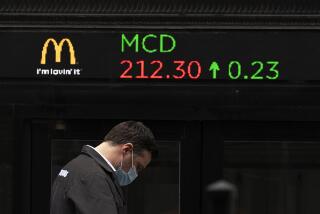More to the Point: ‘Capital Day’
- Share via
When I was young, Labor Day weekend marked the end of summer and the start of school. The holiday seemed to be a celebration of labor’s hard work building the American economy. It was years later that I learned that it is investment in capital and technology that has made labor in the U.S. so productive, enabling the economy to grow.
But over the past three decades, U.S. capital accumulation has slowed. If we want continued improvements in our standard of living, we need to adopt policies that promote capital accumulation. The recent cut in the capital gains tax is a move in the right direction, but it is not enough.
Investments in capital along with developing better ways to use both labor and capital are the fundamental force behind economic growth. Forty years ago, Nobel Prize winning economist Robert Solow suggested a way to measure the contribution of capital to economic growth. The most recent evidence suggests the contribution of capital to U.S. economic growth since World War II has been almost 2 1/2 times that of labor, and capital has even beat out technological change.
Most people ignore the major impact capital has on their paychecks. Workers whose jobs involve capital (machinery, tools, computers) are more productive and make higher wages. For workers who use computers, this translates into a 15% wage premium. It is our vast capital stock that makes the output of unskilled immigrant workers worth more here than in their home countries. Our large capital stock also helps explain our current high standard of living.
But all is not well. The rate of capital accumulation has slowed. We need more policies that will encourage capital formation. Simply put, if we want to continue to enjoy a high standard of living, elected officials need to focus on creating incentives that will increase investment.
The recent capital gains tax cut does not go far enough. Congress and the president should reconsider indexing the capital gains tax to inflation. This would relieve investors of a tax liability on asset price increases that result solely from inflation. Or better yet, eliminate the capital gains tax entirely as part of a comprehensive tax reform program that lowers tax rates across the board. This would benefit not only the owners of capital but also workers, through increased job opportunities, higher wages and lower tax burdens.
Many politicians will decry the revenue loss associated with this type of tax reform. But tax revenue comes from the citizens who earn it in productive activity. Government has no “right” to these funds.
Reducing government spending is as important as tax reform if we want to increase capital accumulation. High taxes needed to feed the often wasteful spending of big government have contributed to the slower rate of capital accumulation.
Capital, labor and technology are not the only factors that influence economic growth. The regulatory and legal systems define and enforce the rules under which we all operate. Clear rules and the reasonable enforcement of contracts are important to all business transactions and have repercussions for the level of capital formation, job creation and technological change.
For most of us, our jobs, our labor, are important parts of our lives. Our efforts contribute to the prosperity of our nation and provide us with income and personal fulfillment. But we need to recognize the important role that capital has played in producing the high standard of living we enjoy. Perhaps we need a day like Labor Day--Capital Day--to reflect on the importance of encouraging capital accumulation.
More to Read
Inside the business of entertainment
The Wide Shot brings you news, analysis and insights on everything from streaming wars to production — and what it all means for the future.
You may occasionally receive promotional content from the Los Angeles Times.










